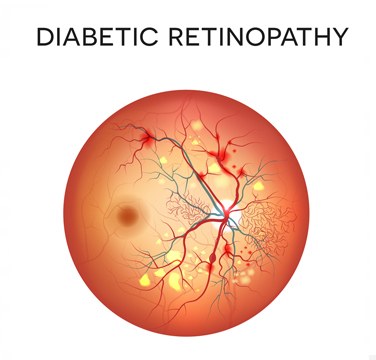Diabetes is a disease that profoundly affects many areas of body. Many people don’t realize how it can affect your eyes. It increases your risk for eye conditions, such as glaucoma and cataracts and primary diabetic retinopathy which can lead to blindness when left untreated. This is important for people with Type 1 or Type 2 diabetes. Adopting lifestyle changes and learning to manage diabetes is very important.
Diabetes Type 1 is a chronic condition in which the pancreas produces little to no insulin. Insulin is a hormone needed to allow sugar to enter cells to produce energy. Once known as juvenile diabetes because it usually appears in childhood or adolescence. A person with Type 1 diabetes is dependent on insulin injections.
Overtime, Type 1 diabetes complications can start to damage the blood vessels of the retina potentially causing blindness and other serious eye concerns. Our doctors monitor this by doing yearly dilated exams and imaging of the retina.

Diabetes Type 2 means your body does not make or use insulin well. Insulin helps glucose or sugar get to cells to give them energy. When you do not have enough insulin too much sugar stays in your blood. Type 2 diabetics are usually non-insulin dependent considering their bodies are able to produce some insulin but unable to use it to control their blood sugar correctly. Many Type 2 patients can control their diabetes with diet or oral medication.
Patients should be aware that their vision may fluctuate or become blurry when their blood sugar levels become too high. If you experience sudden blurry vision always check your blood sugar first before calling your doctor.
Our doctors encourage all patients with diabetes to have a yearly dilated eye exam to monitor the health of the eye and imaging of the retina to watch for early signs of disease. We also encourage patients to check their blood sugar regularly and keep regular appointment with their primary care physician.